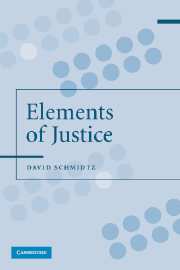Book contents
- Frontmatter
- Contents
- Acknowledgments
- PART 1 WHAT IS JUSTICE?
- PART 2 HOW TO DESERVE
- 6 Desert
- 7 What Did I Do to Deserve This?
- 8 Deserving a Chance
- 9 Deserving and Earning
- 10 Grounding Desert
- 11 Desert as Institutional Artifact
- 12 The Limits of Desert
- PART 3 HOW TO RECIPROCATE
- PART 4 EQUAL RESPECT AND EQUAL SHARES
- PART 5 MEDITATIONS ON NEED
- PART 6 THE RIGHT TO DISTRIBUTE
- References
- Index
10 - Grounding Desert
Published online by Cambridge University Press: 05 June 2012
- Frontmatter
- Contents
- Acknowledgments
- PART 1 WHAT IS JUSTICE?
- PART 2 HOW TO DESERVE
- 6 Desert
- 7 What Did I Do to Deserve This?
- 8 Deserving a Chance
- 9 Deserving and Earning
- 10 Grounding Desert
- 11 Desert as Institutional Artifact
- 12 The Limits of Desert
- PART 3 HOW TO RECIPROCATE
- PART 4 EQUAL RESPECT AND EQUAL SHARES
- PART 5 MEDITATIONS ON NEED
- PART 6 THE RIGHT TO DISTRIBUTE
- References
- Index
Summary
Thesis: One justification for giving people credit for using their opportunities well is that doing so empowers people to use their opportunities well, thereby helping them to live well together.
WHY ONE CONCEPTION RATHER THAN ANOTHER?
Are the two models, compensatory and promissory, truly models of desert? Does it matter? The main issue is not whether we use the same word when referring to those who did their best before receiving rewards and to those who did their best after receiving opportunities. In fact, we do, but the larger question is, are we justified in thinking of desert claims as weighty in both cases?
I explained how in everyday life we grasp the concept of deserving a chance in virtue of what we did, or will do, with it. I would not appeal to common sense to justify our common-sense understanding, though. To justify, we look elsewhere. This chapter indicates (although only indicates) where we might look.
Part of what makes it difficult even to begin such a discussion is that, in trying to justify, we risk trivializing. We risk seeming to ground a thing in considerations less important than the thing itself. That could be a problem when trying to justify a conception of justice. When assessing alternative conceptions of justice, we generally cannot settle the contest by appeal to yet another lofty but contested ideal of justice.
- Type
- Chapter
- Information
- The Elements of Justice , pp. 55 - 61Publisher: Cambridge University PressPrint publication year: 2006



